Best Project Finance Lawyers in Amsterdam
Share your needs with us, get contacted by law firms.
Free. Takes 2 min.
List of the best lawyers in Amsterdam, Netherlands
About Project Finance Law in Amsterdam, Netherlands
Project finance law in Amsterdam, Netherlands, pertains to the structuring and funding of large-scale infrastructure and industrial projects. These projects are typically capital-intensive, such as renewable energy plants, transportation infrastructure, or real estate developments. The financing structure is generally based on the projected cash flows of the project rather than the balance sheets of the project sponsors. Amsterdam, as a key European financial center, supports a robust legal and regulatory framework for project finance, aligning with both Dutch and European Union regulations.
Why You May Need a Lawyer
Engaging a lawyer experienced in project finance is crucial due to the complexity and significant financial stakes involved. Common situations requiring legal assistance include:
- Drafting and negotiating project finance agreements among multiple stakeholders
- Conducting due diligence on regulatory compliance, land rights, and environmental issues
- Structuring security arrangements to protect lenders and investors
- Facilitating public-private partnerships for infrastructure projects
- Managing risks related to tax, insurance, and currency fluctuations
- Advising on dispute resolution should a conflict arise among project participants
A lawyer can help reduce risks, ensure compliance with local and international laws, and protect your financial interests throughout the lifecycle of a project.
Local Laws Overview
Project finance in Amsterdam is shaped by a combination of Dutch national law, European Union directives, and international standards. Key legal aspects to consider include:
- Financial Structuring: Complex financial agreements must comply with Dutch Company Law and principles of contract law.
- Security Interests: Dutch law distinguishes between different types of security, such as pledges and mortgages, which are essential for lenders to mitigate risk.
- Environmental and Planning Laws: Projects must adhere to strict environmental assessments, zoning laws, and permitting procedures.
- Public-Private Partnerships (PPPs): Increasingly common in infrastructure, these require compliance with Dutch procurement laws and transparency standards.
- Taxation: Corporate tax, VAT, and rules on interest deductibility can significantly impact project viability.
- EU Regulations: Cross-border projects may require compliance with EU competition law, state aid rules, and environmental directives.
Navigating these legal requirements typically requires the expertise of lawyers who understand the interplay of local and international legal frameworks.
Frequently Asked Questions
What is project finance?
Project finance is a method of funding large projects by creating a legally independent project company. Repayment is made primarily from the cash flow generated by the project, with the project assets held as collateral.
Which sectors commonly use project finance in Amsterdam?
Typical sectors include renewable energy (like wind and solar), transportation (roads, rail), water infrastructure, telecommunications, and large-scale commercial real estate.
What types of entities are usually involved in a project finance transaction?
Project sponsors, lenders (often banks or institutional investors), contractors, suppliers, and government agencies are commonly involved.
What are the key documents in a Dutch project finance transaction?
Key documents include the loan agreement, security documents (such as mortgage or pledge agreements), shareholder agreements, construction contracts, operation and maintenance agreements, and direct agreements.
How are risks typically allocated in project finance agreements?
Risks are typically allocated to the parties best able to control or mitigate them, through contractual provisions covering construction, operation, supply, offtake, force majeure, and political risks.
Are there any restrictions on foreign investors participating in Dutch project finance projects?
The Netherlands is generally open to foreign investment. However, certain projects may be subject to sector-specific regulation or national security review, particularly those involving critical infrastructure.
What permits or approvals are needed for a project in Amsterdam?
Depending on the nature of the project, permits may be required for land use, construction, environmental impact, and operation. Early engagement with local authorities is essential.
How are environmental issues addressed in project finance?
Environmental compliance is a crucial part of due diligence. Projects must undergo assessments to meet both Dutch and EU environmental regulations, including environmental impact assessments and permitting.
What is the role of public-private partnerships?
PPPs are commonly used for infrastructure projects. They typically involve risk-sharing between the public and private sectors and require compliance with procurement laws and contractual transparency.
How can potential legal disputes be resolved?
Dispute resolution mechanisms are typically set out in the project agreements. Common avenues include Dutch courts, arbitration under international rules, or alternative dispute resolution forums.
Additional Resources
If you are seeking further guidance or information, the following resources can be helpful:
- Dutch Financial Markets Authority (AFM) for regulatory information on financial products and market conduct
- Netherlands Enterprise Agency (RVO) for government support and information on permits and subsidies related to large-scale projects
- Ministry of Infrastructure and Water Management for details on infrastructure projects and regulatory requirements
- Netherlands Bar Association for registered lawyers specializing in project finance and infrastructure law
- European Investment Bank (EIB) for resources on financing and supporting infrastructure in Dutch and EU contexts
Next Steps
If you require legal assistance for a project finance matter in Amsterdam, consider the following steps:
- Identify your project needs and potential legal challenges early in the planning phase
- Gather relevant documentation, including project plans, financial models, and stakeholder information
- Consult a lawyer or law firm with expertise in Dutch project finance law and familiarity with local regulations
- Discuss your project’s specific goals, risks, and financial structure with your legal advisor
- Ensure transparent and open communication among all stakeholders throughout the project
- Take preventive steps to address regulatory, environmental, and operational requirements for long-term project success
Legal guidance is an investment in the security and efficiency of your project. Early, proactive legal involvement can help safeguard your interests and facilitate a smooth path toward successful project completion in Amsterdam, Netherlands.
Lawzana helps you find the best lawyers and law firms in Amsterdam through a curated and pre-screened list of qualified legal professionals. Our platform offers rankings and detailed profiles of attorneys and law firms, allowing you to compare based on practice areas, including Project Finance, experience, and client feedback.
Each profile includes a description of the firm's areas of practice, client reviews, team members and partners, year of establishment, spoken languages, office locations, contact information, social media presence, and any published articles or resources. Most firms on our platform speak English and are experienced in both local and international legal matters.
Get a quote from top-rated law firms in Amsterdam, Netherlands — quickly, securely, and without unnecessary hassle.
Disclaimer:
The information provided on this page is for general informational purposes only and does not constitute legal advice. While we strive to ensure the accuracy and relevance of the content, legal information may change over time, and interpretations of the law can vary. You should always consult with a qualified legal professional for advice specific to your situation.
We disclaim all liability for actions taken or not taken based on the content of this page. If you believe any information is incorrect or outdated, please contact us, and we will review and update it where appropriate.













